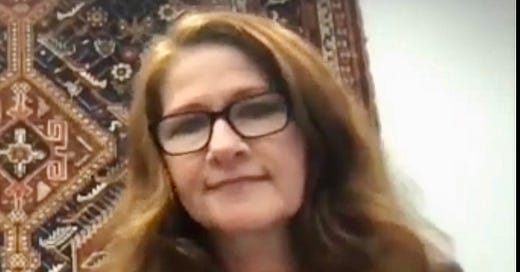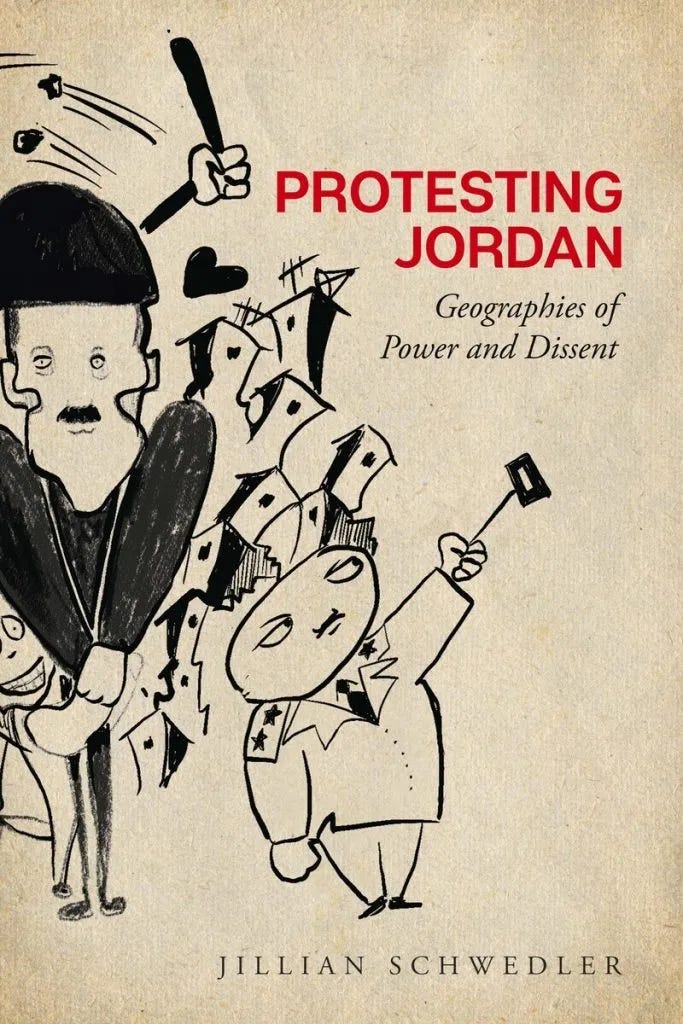MENA Scholar Spotlight: Jillian Schwedler
Our new weekly feature profiles MENA scholars from around the academy
One of my favorite Substack blogs is Danny Hajjar’s Sa’alouni El Nas which focuses on Arabic music and popular culture (you should also check out his curated playlists on Spotify).
Every week, Danny features an informal interview, more of a conversation, with someone interesting — an Arab musician, journalist, artist, film critic, actress, or anyone really — where they talk about their favorite music, cultural productions, or whatever comes up. That inspired me to add a new weekly feature to the blog: a MENA Scholar Spotlight. Each week, I’m going to ask a scholar I like (or at least find interesting!) the same basic set of questions about what they’re reading, what they’re working on, and what they’re interested in. I think it will be really interesting and fun to learn more about our colleagues, and I hope you do too!
The MENA Scholar Spotlight launches this week with a conversation with my old friend (since we were doing research together in Jordan back in the 1990s) and multiple-time co-author/co-editor Jillian Schwedler. She’s a Professor of Political Science at the City University of New York’s Hunter College and the Graduate Center and Nonresident Senior Fellow at the Crown Center at Brandeis University. She’s currently a Distinguished CUNY Scholar at the Advanced Research Collaborative at the Graduate Center. Schwedler is a long-time member of the POMEPS Steering Committee, and for the last decade has been my co-organizer of the Junior Scholar Book Development workship.
Her first book Faith in Moderation was one of the best of an early wave of scholarship on Islamist political parties, exploring in depth how participation in electoral politics did - and didn’t - change religious movements. If you’ve taken your comprehensive exams or worked on the topic, you’ve read her World Politics article on the inclusion-moderation thesis. For the last decade she’s been researching protests in Jordan, and the resulting new book Protesting Jordan was so good that when I reviewed it on the blog in May I called one of the best political science books I’ve read all year. And, of course, she’s the co-editor (along with Sean Yom and me) of The Political Science of the Middle East.
I sent Jillian the set of questions, and we took it from there. Enjoy!
Abu Aardvark: What are you reading right now?
Jillian Schwedler: I’m reading David Graeber and David Wengrow’s The Dawn of Everything, which I am totally loving. It pulls together decades of scholarship across a variety of disciplines and show how much of what we thought we knew about humanity, civilization, and so on, is simply wrong. And it unpacks the politics behind why certain narratives prevail despite ample scholarly evidence to the contrary. My favorite part so far shows how many of the ideas attributed to Enlightenment thinkers were borrowed from Indigenous Americans. Super fascinating stuff and a really easy read.
AA: What’s your favorite thing you’ve ever written?
JS: My new book, Protesting Jordan. I feel that I finally found my own voice, particularly since I didn’t have the pressure of adhering to disciplinary norms to somehow prove that I’m a “real” political science. I’m really proud of it, more than I have ever felt about anything else I’ve written. I hope people find it theoretically and empirically fascinating, of course, but even more I hope they find it enjoyable to read.
AA: What are you currently working on?
JS: I’m developing an article based on some of the theoretical arguments in Protesting Jordan, one that brings in a wide range of materially globally to show how my theoretical approach has broad reach. I want to encourage people to take up my approach and then we can all think comparatively about the insights we can gain from a serious examination of the spatial dynamics of protests and how they shape and are shaped by the built environment. After that article, I’m likely to do another article on gendered dimensions of space and protest, so I have a pile of stuff to read in feminist geography for that project.
AA: What’s your dream research project (and why haven't you done it yet)?
JS: Currently, my dream research project may become a reality if I can get the funding together. I want to do a comparative study of gift shops run by revolutionary groups. I’ve already started with Sinn Fein in Belfast and Hizbollah in Mleeta, Lebanon, and I have a list of others to explore. But I’m planning on finishing the two articles I mentioned first, so this project will have to wait a year before I can get started in earnest.
AA: What scholar(s) besides yourself do you think is currently doing the most interesting work on MENA politics?
JS: Oh gosh that’s a hard question, there’s so much out there that’s fascinating these days. The stuff that I find most interesting is largely interdisciplinary, as I find the mainstream of political science to be narrow and, frankly, often quite boring. The new books by Muriam Haleh Davis, Jonathan Wyrtzen, Hisham Sallem, and Maya Mikdashi are incredible. And I’ll read anything by Laleh Khalili, Lisa Wedeen, and Timothy Mitchell. But really, there’s so much great interdisciplinary stuff these days, I have a pile of books to read.
AA: What’s one resource / opportunity that you wish more MENA politics scholars knew about and took advantage of?
JS: A lot of young scholars are working on Jordan these days in part because it is still an accessible research site. I would love for more scholars to get out of Amman (or at least West Amman) and do work in the other towns, villages, and countryside. That’s not really an answer to your question as posed but I think it’s worth encouraging scholars in that direction. Contact me for specific ideas!
AA: And finally, what question would you like me to ask you? Tell me something about yourself that I might not already know.
JS: Well, you already know that I belong to a Harry Potter fan group and that I’m a boxer. Did you know that I was supposed to star in the movie Atomic Blond? I let Charlize Theron take the role because I wanted to finish my book. I can also tap dance.






